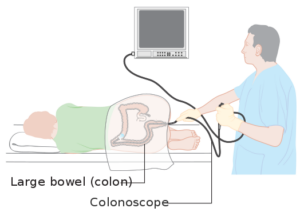
When colon cancer develops between routine colonoscopies, does this mean it was missed or is it usually a new fast growing tumor?
We are advised to have a screening colonoscopy beginning at age 45 and then every 10 years to catch colon cancer.
People with above average risk, including those for whom polyps were found, have shorter intervals between screening colonoscopies.
Nevertheless, it happens: A colon cancer is discovered between colonoscopies.
This includes at some point after the previous colonoscopy was deemed normal.
Imagine being told, “Your colonoscopy was normal,” and then several years later you begin developing concerning symptoms and are diagnosed with colon cancer.
Did the colonoscopy miss this cancer or did it spring up out of nowhere a few years later?
“Interval colon cancers are defined as those cancers diagnosed after a previous colonoscopy and before the next screening/surveillance colonoscopy,” says Santosh Sanagapalli, MD, a consultant gastroenterologist, endoscopist, colonoscopist and specialist in esophageal and bowel disorders.
“There are four possible reasons for interval cancers developing.”
• Polyps that were missed on the initial colonoscopy, that progressed to a cancer.
• Polyps identified on the initial examination, but incompletely resected.
• New polyps developing following the initial colonoscopy, that rapidly progressed (the standard rate of progression from small polyp is generally thought to be at least a decade or more).
• Failure to visualize a cancer that was present on the initial colonoscopy.
“It is very difficult to determine which of the four causes is responsible for development of an individual case of interval cancer.
“However, using mathematical models, others have concluded that the majority of interval cancers result from missed rather than new lesions.
“The colonoscopy is highly dependent on its operator, and there is now plenty of evidence for this.”
How does a colonoscopy miss a tumor?

Cancer Research UK
“There is substantial variation in detection of adenomas (the most common precursor of colorectal cancer),” continues Dr. Sanagapalli.
Researchers from Huntsman Cancer Institute (HCI) at the University of Utah looked into this phenomenon and discovered:
1 The interval colon cancers tended to appear in patients 65-plus
2 In patients with a family history of the disease
3 In those who’ve previously had polyps
Not only that, but the “missed” cancers in the study’s patients tended to appear on the right portion of the colon, which, interestingly, is at the far end of the reach of the colonoscope.
“Further, large U.S. studies have shown that the adenoma detection rate of a colonoscopist (measured as a percentage of all colonoscopies they perform where they detect an adenoma) is inversely proportional to the rate of interval cancer in their patients,” says Dr. Sanagapalli.
“Put in other words, the more adenomas a colonoscopist detects in their colonoscopies, the less likely they are to ‘miss’ significant lesions that can turn into an interval colon cancer.”
This is why, when you’re seeking a gastroenterologist to perform your colonoscopy, you should ask what his or her adenoma detection rate is.
It is perfectly fine for the patient to seek this information, and you should never be reluctant to.
It should be at least 15% for female patients and 25% for male.
Don’t Squawk About the Prep
“If the bowel is not adequately cleansed, fragments of stool and debris can easily obscure a small polyp/adenoma that may then be missed and turned into cancer,” says Dr. Sanagapalli.
“For this reason, much research has gone into improving the quality of bowel preparation in recent years.
“One major advance in recent years is our understanding of the value of ‘split’ bowel preparation.
“This is where the last dose of the bowel preparation is taken on the day of the surgery (usually two to four hours prior to the procedure), rather than the night before.
“This has been shown to improve the quality of bowel preparation significantly, especially in the right colon.
“By doing so, the rate of detection of polyps is improved, and therefore the risk of interval cancers is reduced.
“For this reason, ‘split’ bowel preparation has now become the standard of care.”
Can we ever prevent a missed colon cancer?
“Even with the best colonoscopists and perfect bowel preparation, not all interval cancers will be prevented.
“There is evidence to suggest that around a quarter of interval cancers occur through no deficiency of the initial colonoscopic examination, and are simply due to a new polyp that rapidly progressed.
“Ongoing research is focused on identifying characteristics of patients and polyps that may have rapidly progressed, so we can schedule more frequent colonoscopies for such patients.”

 Dr. Sanagapalli
Dr. Sanagapalli







































